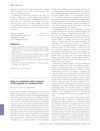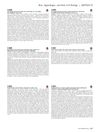 January 2008 in “Springer eBooks”
January 2008 in “Springer eBooks” Thyroid disease can cause hair loss and treating thyroid problems might help with hair disorders.
 August 2005 in “British journal of dermatology/British journal of dermatology, Supplement”
August 2005 in “British journal of dermatology/British journal of dermatology, Supplement” Melatonin may help treat hair loss and needs more research.
 February 1960 in “Journal of the American Medical Association”
February 1960 in “Journal of the American Medical Association” Treatments for hair loss include estrogen therapy and special shampoos.
[object Object]  63 citations,
March 1995 in “International Journal of Dermatology”
63 citations,
March 1995 in “International Journal of Dermatology” Some drugs can cause hair loss, and stopping these drugs often leads to hair regrowth.
 2 citations,
May 2021 in “Scientific Reports”
2 citations,
May 2021 in “Scientific Reports” Stress is likely causing hair loss in Formosan macaques.
 2 citations,
July 2013 in “Veterinary dermatology”
2 citations,
July 2013 in “Veterinary dermatology” Dog skin with hair loss, when transplanted to mice, regrew hair, suggesting the hair loss cause is likely body-wide, not skin-specific.
 1 citations,
September 2018 in “Journal of the American Academy of Dermatology”
1 citations,
September 2018 in “Journal of the American Academy of Dermatology” Children with autoimmune hair loss have similar vitamin D levels to healthy kids, suggesting no extra screening is needed.
 1 citations,
January 2018 in “Journal of Cosmetics, Dermatological Sciences and Applications”
1 citations,
January 2018 in “Journal of Cosmetics, Dermatological Sciences and Applications” Ostrich antibodies helped regrow hair in men with hair loss, but the application needs to be easier.
 26 citations,
January 2019 in “Expert Opinion on Investigational Drugs”
26 citations,
January 2019 in “Expert Opinion on Investigational Drugs” New treatments for hair loss show promise, but more research is needed to confirm their safety and effectiveness.
[object Object]  16 citations,
September 2018 in “Journal of Ethnopharmacology”
16 citations,
September 2018 in “Journal of Ethnopharmacology” Plant-based remedies may treat hair loss by reducing inflammation and improving insulin resistance.
 10 citations,
December 2005 in “Aktuelle Dermatologie”
10 citations,
December 2005 in “Aktuelle Dermatologie” Alfatradiol (0.025%) is an effective and safe treatment for hair loss in both women and men.
 8 citations,
June 2020 in “International Journal of Dermatology”
8 citations,
June 2020 in “International Journal of Dermatology” Men with early hair loss have lower vitamin D levels.
 8 citations,
September 2010 in “Journal of Men's Health”
8 citations,
September 2010 in “Journal of Men's Health” Androgenic Alopecia, a common hair loss condition, can be effectively treated with finasteride and other treatments.
 3 citations,
March 2022 in “Polymers”
3 citations,
March 2022 in “Polymers” Substances from Ascidian tunics might help treat hair loss as effectively as Minoxidil.
 1 citations,
January 2015 in “Springer eBooks”
1 citations,
January 2015 in “Springer eBooks” AGA is a common hair loss disorder, and early diagnosis and treatment with minoxidil or finasteride can help reduce emotional distress.
 July 2017 in “The American Journal of Cosmetic Surgery”
July 2017 in “The American Journal of Cosmetic Surgery” A patient's hair loss after a browlift surgery improved on its own over 8 months.

Melatonin applied to the scalp helps treat early-stage hair loss in men and women.
 40 citations,
January 1996 in “Journal of Dermatological Treatment”
40 citations,
January 1996 in “Journal of Dermatological Treatment” Antimicrobial lotion reduces inflammation and increases hair density in hair loss patients.
 4 citations,
April 2010 in “Expert review of dermatology”
4 citations,
April 2010 in “Expert review of dermatology” Restoring immune privilege in hair follicles could help treat certain types of hair loss.
 November 2022 in “Journal of Education, Health and Sport”
November 2022 in “Journal of Education, Health and Sport” The skin's bacteria might influence the development of a hair loss condition called alopecia areata.
 14 citations,
October 2020 in “Natural Products and Bioprospecting”
14 citations,
October 2020 in “Natural Products and Bioprospecting” Various treatments, including FDA-approved drugs, natural products, and oral supplements, can help with hair loss, but a patient's medical history and potential allergies should be considered when choosing a treatment.
 April 2018 in “Journal of Investigative Dermatology”
April 2018 in “Journal of Investigative Dermatology” Light can activate hair growth through a pathway from the eyes to hair follicles.
 16 citations,
December 2006 in “Expert Review of Dermatology”
16 citations,
December 2006 in “Expert Review of Dermatology” Hair follicles are essential for skin health, aiding in hair growth, wound healing, and immune function.
 7 citations,
June 2022 in “Frontiers in Veterinary Science”
7 citations,
June 2022 in “Frontiers in Veterinary Science” Researchers found genes linked to hair growth cycles in Inner Mongolia cashmere goats, which could help understand and treat hair loss.
134 citations,
July 2020 in “Experimental dermatology” Hair follicles are normally protected from the immune system, but when this protection fails, it can cause hair loss in alopecia areata.
 116 citations,
May 2013 in “Proceedings of the National Academy of Sciences of the United States of America”
116 citations,
May 2013 in “Proceedings of the National Academy of Sciences of the United States of America” Hair grows faster in the morning and is more vulnerable to damage from radiation due to the internal clock in hair follicle cells.
 11 citations,
January 2011 in “Turkish Journal of Medical Sciences”
11 citations,
January 2011 in “Turkish Journal of Medical Sciences” Low iron levels are a significant risk factor for hair loss, while high vitamin D levels might be a response to hair loss, not a cause.
 March 2014 in “CRC Press eBooks”
March 2014 in “CRC Press eBooks” Some nutrients and antioxidants may improve skin and hair health, but more research is needed to confirm these benefits.
 47 citations,
January 2013 in “International Journal of Cosmetic Science”
47 citations,
January 2013 in “International Journal of Cosmetic Science” Hair diversity is influenced by complex genetics and environmental factors, requiring more research for practical solutions.
 29 citations,
September 2012 in “Dermatologic Clinics”
29 citations,
September 2012 in “Dermatologic Clinics” Hair disorders are caused by a complex mix of biology, genetics, hormones, and environmental factors, affecting hair growth and leading to conditions like alopecia.





























